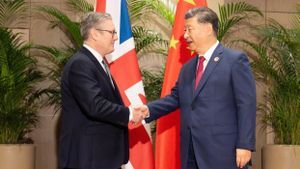Vice President Kamala Harris and former President Donald Trump recently made headlines with their contrasting economic pitches aiming at the 2024 election. Both politicians delivered major speeches, focusing on the economy, but left many observers wanting for more substantial policy details.
During speeches held last week, neither candidate provided detailed economic plans. Ms. Harris's half-hour focus on affordable living expenses and Mr. Trump's 80-minute ramble through various economic thoughts produced little clarity on their actual policies.
Despite the lack of comprehensive agendas, both candidates articulated differing visions for America’s economy. They emphasized the role of the federal government but diverged sharply on the extent and methods of intervention.
Harris's emphasis on progressive economics reflects her party's drive for extensive government action to address economic challenges. This perspective offers a blueprint centered on using federal power to introduce significant reforms, particularly focusing on the middle and lower classes.
She unveiled ambitious plans, including tax increases for corporations and the affluent to fund assistance for those struggling to build wealth. Hers is a call for government involvement to correct market distortions, boost competition, and provide relief for working families.
Central to Harris's plan is her proposal to provide up to $25,000 for first-time homebuyers over the next four years, alongside substantial investments to construct accessible starter homes. She also advocated for reinstatement of the expanded child tax credit initiated during President Biden's first term.
Additionally, she proposed measures against corporate price gouging and increased penalties for companies mismanaging food prices. “My plan will include new penalties for opportunistic companies,” she stated, aiming to make the food industry more competitive.
Yet, questions linger about how Harris plans to finance these initiatives, particularly which corporate tax increases she would pursue. Some analysts worry her proposals could escalate the federal deficit significantly, estimating it might rise by $1.7 trillion over the next decade without measures to offset this cost.
Meanwhile, Trump's economic approach starkly contrasts with Harris's agenda, banking on tax reductions and encouraging private sector growth. Trump's campaign promises include extending the 2017 tax cuts and eliminating taxes for service workers' tips and for seniors on Social Security.
Trump's economic philosophy centers on reducing government intervention and empowering individuals and businesses through tax cuts. He criticized Harris's plan as promoting excessive government control, seeing it as detrimental to economic growth.
This approach aligns with traditional Republican values but faces scrutiny over the feasibility of sustaining tax cuts. Financial experts caution about the long-term impacts of such sweeping tax reductions, emphasizing concerns about debt and deficits.
An AP-Norc poll captured public sentiment, with respondents showing greater trust in Trump handling the economy—45 percent versus Harris's 38 percent. Such statistics highlight the challenge Harris faces as she seeks to convince voters of her economic strategy's efficacy.
Harris and Trump also share certain similarities, both recognizing the power of government to influence economic outcomes but advocating for vastly different methods. While Harris views strong regulations and assistance as pathways to economic stability, Trump promotes deregulation and tax incentives to spur growth.
At her recent speech, Harris called for support for those most affected by rising costs of living. She underscored her commitment to ensuring the middle class can thrive through systematic changes aimed at affordability.
Critics suggest Harris’s populist rhetoric may lack substance, with some pointing to her recent gaffe during the speech conflated price gouging with price gauging. This mishap has raised eyebrows, questioning her grasp of economic details.
With these contrasting strategies, voters have clear choices to make as the election approaches. The core of the battle will revolve around which economic vision resonates more effectively with the electorate amid rising costs and inflationary pressures.
Trump's rally-style speeches stand out as platforms for verbal sparring with his critiques aimed at perceived federal overreach. His supporters respond favorably, mirroring their preference for minimal government intervention.
Harris's approach seeks to blend governmental support with actionable policies aimed at fairness and sustainability. Observers argue the effectiveness of these plans will largely depend on her ability to translate rhetoric to tangible results.
Both candidates must navigate the electorate’s fatigue over economic struggles and the expectation for serious remedies. Each side presents their narrative on how to restore economic balance and provide equitable opportunities to Americans.
How these economic plans take shape on the campaign trail remains to be seen. With multiple facets influencing voters, economic priorities are poised to play pivotal roles as Americans prepare for another presidential election.
The stakes escalate as both candidates gear up for debates and more public appearances. Voter engagement and morale hinge on their ability to present convincing arguments and sound fiscal foresight.



